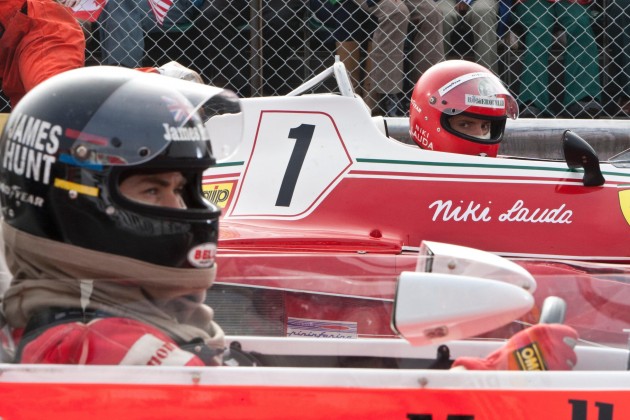Formula One rivals drive Howard’s ability as director

“Rush” opens with a close-up of an eye.
We don’t know whose eye we are seeing, but the audience may assume it is that of Chris Hemsworth, who plays Formula One racer James Hunt.
If we want to get symptomatic, the piercing blue eye can be seen as from director Ron Howard, who has an eye for stories about men who not only risk their careers, but also their lives in films such as “Apollo 13,” “A Beautiful Mind” and “Frost/Nixon.” His newest picture can perhaps be thought of as his best and the most un-Ron Howard film he has made throughout his 30-year career in the director’s chair.
“Rush” digs deep into the psyche of men who are willing to endanger their lives for the price of glory.
Set in the 1970s, “Rush” is the true story about the contentious and competitive friendship of Hunt and Niki Lauda, played by the superb Daniel Bruhl (“Inglourious Basterds”).
The rivalry begins at the beginning of their racing careers and continues when both men reach the professional circuit.
Their impassioned bromance is fueled by their disparate personalities.
Hunt is the free-spirited, arrogant Brit whose demeanor Lauda finds infuriating, as compared to the more structured regiment rooted in his Austrian heritage he believes a racer must endure in order to be champion.
On the track, Lauda and Hunt’s determination to win, and to win at whatever the cost, separates them from the rest of the circuit.
The majority of the film takes place in 1976 during the quest for the Formula One Championship, and Howard, putting his faith in the image, amplifies the tension-filled racing scenes with close-ups that are both visceral and beautiful.
From wheels screeching to eyes fixed on the checker flag, he places the audience in the drivers’ seats of these dynamic racecars.
When the film is off the racetracks, we see the variances in the lives both men lead.
Lauda is intelligent but consumed with building the perfect car. If it means isolating himself from the rest of his team, so be it.
He obsesses about the honor of being champion and defeating Hunt along the way. When he meets his wife, Marlene (Alexandra Maria Lara), we see a different side of Lauda. He is vulnerable and conscious of a life outside of racing.
Hunt meanwhile goes through a series of misfortunes along the way – a divorce from his wife Suzy (Olivia Wilde), bankruptcy from sponsors and driving in the shadows of Lauda, who is reigning champion of the circuit.
Screenwriter Peter Morgan has worked with Howard before in the film “Frost/Nixon” and stays true to the origins of these men and where they come from, particularly with Lauda’s Austrian roots.
In the film, Lauda has conversations with Marlene, almost all in German, which adds a layer of authenticity to the dynamics of their relationship.
When Howard started out as a filmmaker, he made cheap on-the-fly exploitation films for cult director Roger Corman, such as the drag race teen flick, “Grand Theft Auto.”
For some reason, he has always been caught between making Hollywood junk and less commercially driven projects such as “Frost/Nixon,” but in “Rush,” Howard’s instincts behind the camera turn the film into a visceral cinematic experience.
The joy of filmmaking from Howard seeps through every shot, but it also helps to have the wonderful cinematographer Anthony Dod Mantle. Shooting in digital, Mantle gives the film a 1970s aesthetic, with saturated colors and foggy lighting techniques.
In the penultimate scene, Hunt and Lauda have an exchange of words, but it is not merely frivolous banter between two rivals who obviously revere one another. It is more of an exchange of philosophies on how to live life.
It appears Howard is mindful of both men and their convictions toward being a champion. He has taken a chance, all for the “will to win,” and has created a film that is brutal, honest and a fine example about man’s determination for glory.
Grade: B+







